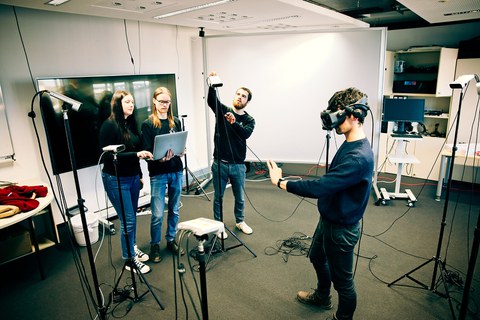Applied Computer Science (2025)
Table of contents
Goals
Computer science is changing our everyday lives: artificial intelligence is revolutionizing our industry and medical care, smart solutions for housing and transport
are designed to make our future sustainable and simpler. Almost every household appliance is programmable today. Computer science creates the conditions for this. No scientific discipline is as lively and versatile.
On the Bachelor's degree course in Applied Computer Science , you will learn to develop suitable structures and methods for complex and intelligent systems and to design them efficiently and securely. To do this, you will acquire application-oriented knowledge in information processing, software engineering and the architecture and technical foundations of complex and intelligent systems. You will learn to use scientific methods and work in interdisciplinary teams.
Structure and content
The Bachelor's degree course in Applied Computer Science combines mathematical and computer science fundamentals with an introduction to modern computer science topics. The course has a modular structure and comprises 18 compulsory modules. In the first semester, working in seminar groups with a joint timetable and exercise plan makes it easier for you to get started.
The course focuses on mathematics, algorithms, programming, structure and behavior of complex systems, human-computer interaction, artificial intelligence, database systems, operating systems, security aspects of data, systems and users.
In addition to the broad-based training in the scientific foundations of computer science, you can deepen your knowledge in media related subjects:
- Media Computer Science
As a hybrid subject, Media Computer Science combines the best of two worlds. As a link between people and machines, it combines computer science and design to make digital systems optimally usable for people. You will develop interactive user interfaces that make operating devices and systems easy and pleasant.
The specialization provides you with knowledge of design aspects, multimedia technologies and applications. Your acquired knowledge will be consolidated in a variety of practical tasks. Numerous computer workstations with extensive equipment and special laboratories equipped with high-end visualization technology, 3D mixed reality technologies, motion tracking technology or modern audio and video editing technology are available for this purpose.
You will also acquire key skills such as teamwork, communication and languages, which will prepare you for professional life.
Graduation
Once you have passed the Bachelor's examination, you will be awarded the degree "Bachelor of Science" (abbreviated to B.Sc.).
Study requirements
The prerequisite for admission to the course is a general higher education entrance qualification (Abitur) or a comparable higher education entrance qualification.
The course begins in the winter semester. Applications must be submitted by September 15 of each year via the online application of the Admissions Office or the International Office.
The degree program is taught in German. Accordingly, we ask international applicants and German applicants with a foreign university entrance qualification to consult the website for information on the required language skills.

